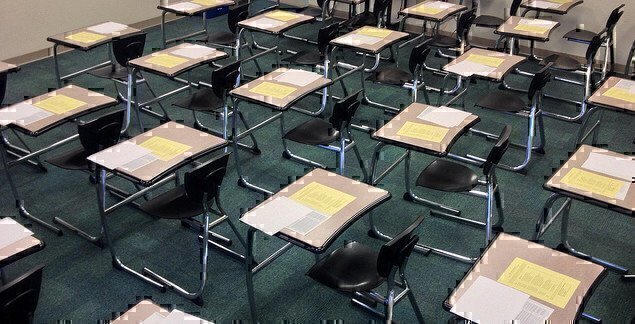Photo Credit: Eric E Castro
A lot of mystery seeps into conversations about the infamous Graduate Record Examination (GRE) — conversations that mostly funnel into further mystery and individual wonderment. Thankfully, in reality, all the GRE requires of a test-taker is preparation — something veterans are rather keen on, conveniently so.
That said, no amount of preparation — the week, day or night prior to taking the GRE exam — will suffice. It is simply not possible. Unless you are equipped with a photographic memory, the GRE requires lengthy preparation, like training for a deployment. In order to complete training you must first orientate yourself to the task at hand. Here you will find out what the GRE really means for you as an undergrad.
Note: If you have already thrown in the GRE towel, check out this site for graduate schools that don’t require it.
Twice now I’ve taken the GRE exam; I realized after the first go-around that I hadn’t come close to prepping the way I should have. But the nice thing about the GRE is that you can take it again, again, and over again. The negative side is that it costs money. VA reimbursement for the test is shaky at best. Currently, for every exam you elect the Post-9/11 GI Bill to pay for, you’ll lose an entire month of benefits, while the good ol’ Montgomery GI Bill only deducts the cost of the exam (perhaps the only upshot of the MGIB nowadays). The GRE runs upwards of $200, or, in other words, highway robbery (not including travel, study guides, etc.). For further advice on skirting the GRE fee with VA benefits, visit this VA site. But if you’ve chosen the Post-9/11 (which is the wiser choice for higher academic education), it’ll actually save you money by footing the bill out of your own pocket.
The GRE is often an unwaiverable requirement for graduate schooling (although for many schools it’s just a check in the box). Of course, you don’t want to do poorly on the exam — the importance of your scores vary depending on your field of study and how competitive the school is — but generally speaking, graduate applications are not about how well you did on the GRE; instead, they are weighed in letters of recommendation (ensure you give anyone writing you a letter of recommendation a heads-up long in advance), your writing sample, and your statement of purpose/intent. Take extra care with these requirements. Write them well. Treat them as your golden tickets.
Now to the nuts and bolts of prepping: Since most of us spend a considerable amount of downtime on the net, make the most of it. There are several free GRE practice apps that you can download to your iPhone. The Arcadia Prep GRE app is multifunctional, covering all the bases, while other applications centralize on quantitative reasoning, i.e. math, or vocabulary, like the MIT-crafted IntelliVocab. A popular, all-encompassing prepping method is through Magoosh, which, for $80, offers 200 video lessons, 1,000 practice questions, three practice tests and a score predictor.
All things considered, if you’re looking to further your higher educational goals, such as the Adonis of pedagogy: the Ph.D., then creating a rigid schedule of studying for the GRE — training the brain to master each wicket of its respective study — is essential.
READ NEXT: Is Getting a Master’s Degree Worth It?








